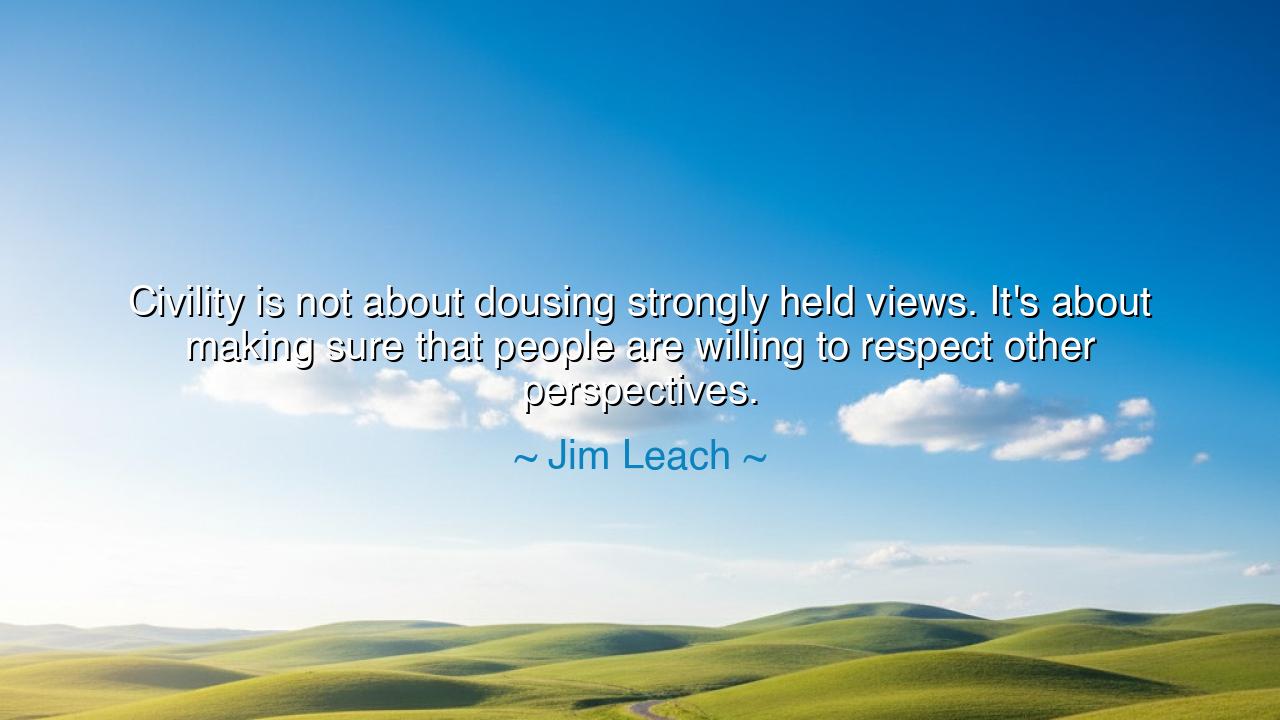
Civility is not about dousing strongly held views. It's about
Civility is not about dousing strongly held views. It's about making sure that people are willing to respect other perspectives.






Listen closely, O children of thought and seekers of virtue, to the words of Jim Leach, who proclaimed: "Civility is not about dousing strongly held views. It's about making sure that people are willing to respect other perspectives." In this simple yet profound statement lies a mirror of the human soul, reflecting the eternal tension between passion and restraint, between the fervor of belief and the wisdom of respect. Civility, far from being the surrender of conviction, is the sacred art of holding your truth firmly while acknowledging that the truths of others also bear weight in the world.
In the grand halls of ancient Athens, philosophers debated fiercely, yet the measure of a citizen was not merely the strength of their argument but their capacity to listen, respond, and honor the perspectives of others. Socrates, though unwavering in his pursuit of wisdom, never silenced those who disagreed; he guided dialogue with patience and reason, demonstrating that civility is not weakness, but strength disciplined by empathy. Here, Leach’s words echo across time: one may hold conviction as a flame, yet it must illuminate, not scorch, the space where others stand.
Consider the example of Abraham Lincoln, a man beset by the turbulent currents of a divided nation. Lincoln held strongly to his vision of a union free from slavery, yet he engaged with those whose views opposed his own, listening, debating, and striving for understanding. In the halls of Congress, in letters and speeches, he embodied the principle that respect for other perspectives does not extinguish one’s own moral clarity—it strengthens it, forging bridges where enmity might otherwise rise.
Leach’s reflection reminds us that in times of strife, the human tendency is to shout louder, to drown out dissenting voices, to confuse power with truth. Yet the ancients knew that wisdom is not born of domination, but of dialogue. The Roman statesman Cicero warned that a republic could not endure if citizens spoke only to be heard and never to understand. True civility, as Leach teaches, demands restraint, courage, and a willingness to recognize that the world is vast, and the human heart complex, and no one perspective holds the entirety of truth.
Let us not forget the story of the Salem Witch Trials, where fear and rigid certainty consumed the minds of men and women, and civility vanished into hysteria. In that dark moment, the failure to respect differing views, to listen and deliberate with temperance, led to injustice and tragedy. History is a stern teacher: when respect for perspective is abandoned, even strongly held views, however justified they may seem, can bring devastation. Civility is the safeguard that channels human passion into understanding rather than destruction.
The lesson Leach imparts is both profound and practical: to be civil is to wield your convictions like a blade sharpened but tempered, ready to defend truth without maiming those who see differently. It is a skill, an art, and a moral responsibility. In our lives, in conversation, in debate, in moments of anger or disagreement, we are called to listen deeply, speak thoughtfully, and honor the perspectives of others without surrendering our own. In this, civility becomes not mere etiquette, but the forge of wisdom, the vessel of trust, and the foundation of lasting relationships.
Practical action is clear: when confronted with opposing views, pause. Seek to understand before seeking to persuade. Engage with empathy, question with curiosity, and respond with clarity. Strengthen your convictions not by silencing others, but by recognizing that the exchange of ideas, conducted with respect and civility, is the pathway to enlightenment. Hold your beliefs firmly, yet hold space for the humanity and perspectives of others.
O seeker of wisdom, remember this: civility does not dilute truth; it elevates it. In honoring other perspectives while standing steadfast in your own, you create a world where dialogue is possible, where justice is tempered by understanding, and where humanity may flourish. Let your voice be strong, yet your heart open, and let every conversation be a testament to the enduring power of civility and respect.
If you wish, I can also craft a narrated-style version, with rhythmic rises and falls, pauses, and emphases to make this lesson even more compelling when read aloud, like an ancient teaching. Do you want me to do that?






AAdministratorAdministrator
Welcome, honored guests. Please leave a comment, we will respond soon